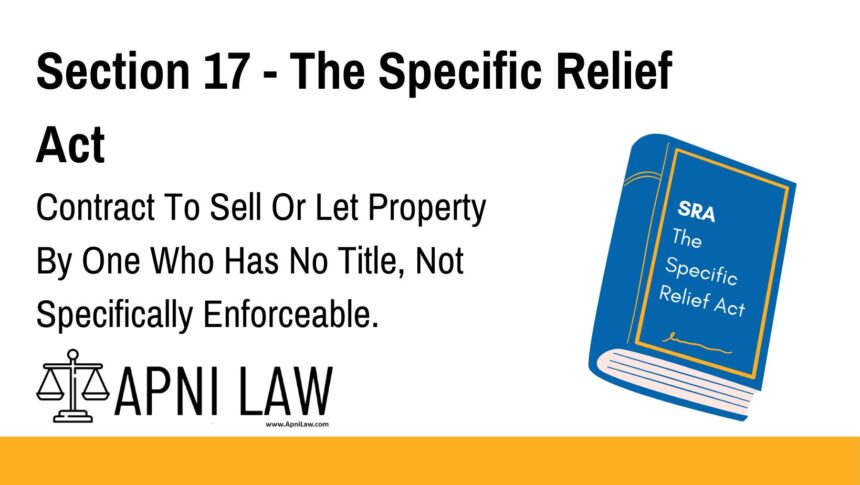Code: Section 17 of The Specific Relief Act
17. Contract to sell or let property by one who has no title, not specifically enforceable
(1) A contract to sell or let any immovable property cannot be specifically enforced in favor of a vendor or lessor:
(a) who, knowing himself not to have any title to the property, has contracted to sell or let the property;
(b) who, though he entered into the contract believing that he had a good title to the property, cannot, at the time fixed by the parties or by the court for the completion of the sale or letting, give the purchaser or lessee a title free from reasonable doubt.
(2) The provisions of sub-section (1) shall also apply, as far as may be, to contracts for the sale or hire of movable property.
Explanation of Section 17:
Section 17 of the Specific Relief Act deals with situations where a contract to sell or let property cannot be specifically enforced because the seller or lessor does not have title to the property. This section highlights the importance of the title in property transactions and restricts specific performance in cases where the person attempting to sell or let the property does not have the legal right to do so.
Key Provisions:
- No Title to Property (Subsection 1(a)): If a vendor or lessor knows they do not have a title to the property and still enters into a contract to sell or let it, they cannot be forced to specifically perform the contract.
- Belief in Good Title but No Title (Subsection 1(b)): If the vendor or lessor believes they have a valid title but, at the time of completing the sale or letting, cannot provide a title free from reasonable doubt, specific performance will not be granted.
- Movable Property (Subsection 2): The same provisions apply to contracts involving the sale or hire of movable property as far as applicable.
Illustration:
Example 1: Lack of Title to Property
John enters into a contract with Sarah to sell her a plot of land. However, John knows that the land does not belong to him and is not legally entitled to sell it. Sarah seeks to enforce the contract, but under Section 17, specific performance cannot be granted because John has no title to the property.
Example 2: Belief of Good Title but Doubtful Title
Emily contracts to sell her house to David, believing that she has clear title to it. However, at the time of completion, it is discovered that there is a legal dispute regarding the title. Since Emily cannot provide a clear and undisputed title, David cannot compel Emily to specifically perform the contract.
Example 3: Sale of Movable Property Without Title
A person enters into a contract to sell a car that they do not own. Even if they believe they own the car, they cannot be forced to specifically perform the sale if they cannot prove ownership at the time the contract is to be executed.
Common Questions and Answers on Section 17:
1. Can I enforce a contract if the seller doesn’t have title to the property?
No, if the seller or lessor knows they do not have title to the property, or if they cannot provide a clear title at the time of completion, you cannot enforce the contract through specific performance.
2. What happens if the seller believes they have a good title, but it turns out they do not?
Even if the seller believes they have a good title, if they cannot provide a clear title at the time of completion, the contract cannot be enforced through specific performance.
3. Does this section apply only to immovable property?
No, the provisions also apply to movable property contracts as far as applicable, meaning that the same restrictions on enforcing the contract apply to movable property in certain cases.
4. Can I enforce a contract for the sale of property if the title is disputed?
No, if the title is disputed and cannot be proven to be free from reasonable doubt, specific performance cannot be granted under Section 17.
Conclusion:
Section 17 of the Specific Relief Act ensures that contracts to sell or let property cannot be enforced if the seller or lessor does not have clear title to the property. This provision safeguards the interests of the buyer or lessee, ensuring that they do not enter into contracts based on invalid or questionable titles. It also applies to contracts involving movable property, providing a similar level of protection.








